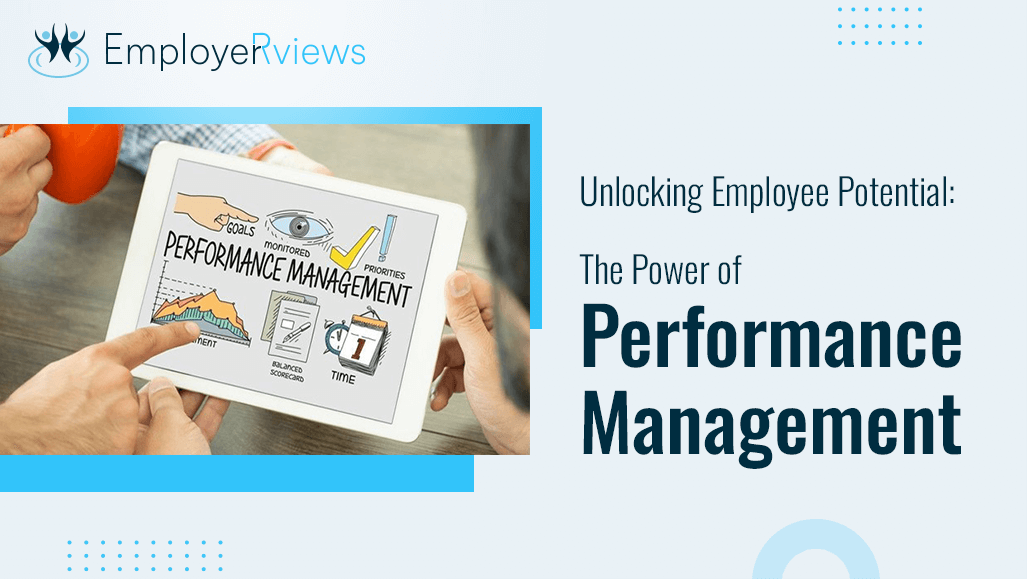
 Don't have an account yet? Sign Up
Don't have an account yet? Sign Up

Organizations are continuously looking for ways to improve efficiency, encourage employee development, and ultimately meet their business objectives in the dynamic modern workplace. An important tactic that has been helpful in this endeavor is efficient performance management. Organizations may optimize individual contributions and foster a culture of continuous growth by helping people reach their full potential. This article will discuss the importance of performance management and how it can be a potent instrument for bringing a workforce's hidden potential to life.

A thorough strategy for ensuring that workers effectively contribute to an organization's goals is performance management. It entails a methodical approach to creating, planning, overseeing, and assessing an employee's performance. Performance management incorporates the customary performance evaluation, but it goes beyond simple evaluation to include goal setting, professional development, continuous communication, and feedback.
Setting clear expectations is the cornerstone of talent management. Employees are better able to coordinate their efforts with company goals when they have a clear awareness of their roles, responsibilities, and performance requirements. Employees are given a path to success by defining SMART goals—specific, measurable, realistic, relevant, and time-bound—which helps them feel motivated and purposeful in their job.
Regular constructive feedback enhances the effectiveness of performance management. A continuous feedback mechanism is becoming more and more popular among employers instead of waiting for an annual performance evaluation. Frequent check-ins offer managers and staff members the chance to discuss, clarify, and modify objectives and standards. In addition to maintaining employee engagement, this continuous communication makes it possible to promptly resolve problems and stop problems from getting worse.
Rewards and recognition are essential for inspiring workers to give their best work. A key component of efficient performance management is recognizing and applauding both individual and group achievements. Positive work environments are created when efforts to recognize hard work and achievement are acknowledged, whether through official recognition programs, team meetings, or other means. Employee commitment and motivation to do well in their jobs are more likely to persist when they feel valued.
Performance management is a mutually beneficial relationship that helps the company and the employee. Managers can determine areas where staff members might benefit from further training or development by conducting regular evaluations and providing feedback. Through proactive resolution of these needs, firms make investments in the development and improvement of their workforce's skills. This not only improves individual talents but also makes the firm more competitive and adaptable overall in a business environment that is changing quickly.
Unlocking potential depends critically on employee engagement. Employee engagement is strongly correlated with discretionary effort, innovation, and favorable workplace culture contributions. Performance management has a major role in promoting employee engagement because of its emphasis on feedback, open communication, and growth possibilities.
Individual ambitions must be in perfect harmony with broader company objectives for an organization to prosper. Performance and talent management helps to achieve this alignment by making sure that workers are aware of how their job fits into the organization's larger goals. Employees are more driven, devoted, and invested in reaching both individual and group objectives when they can clearly connect their efforts to the company's success.
Firms hoping to prosper in the cutthroat economic climate of today must strategically prioritize realizing the potential of their workforce. In this endeavor, performance management proves to be a potent instrument, furnishing a structure for establishing goals, delivering ongoing evaluations, acknowledging accomplishments, and promoting staff growth. Register with Employer Views platform to connect with employees that can deliver high performance by following performance management tips. Organizations that invest in performance management strategies optimize individual contributions and foster a culture of innovation, adaptation, and continual development. Performance management's ability to unlock employees' full potential and propel businesses toward long-term success continues to grow as the workforce does.
1. In what ways does performance management vary from conventional performance evaluations?
Performance management is not the same as traditional evaluations because it goes beyond regular annual appraisals to include goal setting, ongoing feedback, and holistic growth.
2. What role can performance management play in raising employee happiness and engagement levels? Through regular feedback, goal alignment, and reward, performance management may increase employee happiness and engagement and create a pleasant work environment.
3. How does performance management help employees reach their full potential? What part does goal-setting play?
By addressing developmental needs, establishing clear goals, and offering continuous feedback, performance management helps staff members realize their full potential while maintaining alignment with company goals.
4. What are some effective ways for firms to include ongoing feedback in their performance management procedures?
Organizations can include continuous feedback into performance management through the use of technological platforms, frequent check-ins, and the promotion of an open and collaborative culture.
5. How does talent development and an organization's overall competitiveness benefit from performance management?
Through the identification and resolution of developmental requirements, the maintenance of goal alignment, and the development of a trained and motivated workforce, performance management enhances talent development and organizational competitiveness.